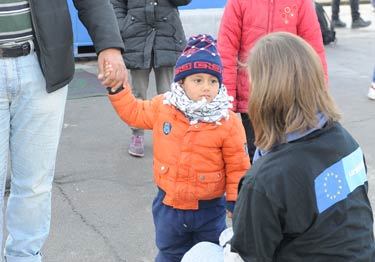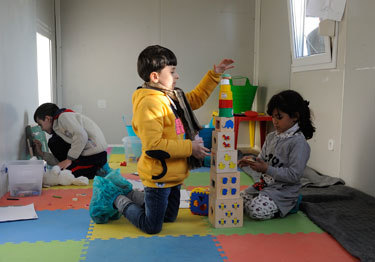Helping refugees and migrants weather the Balkan winter
2015-12-02
© UNICEF/UNI200630/Sanadiki
By Guy De Launey
As temperatures drop and families continue to arrive in Europe in search of safety and a better life, UNICEF and its partners are working urgently to provide support to the youngest travellers.
SID, Serbia/ HONG KONG, 2 December 2015 – Chartered buses lined up at the Sid railway station unload their passengers on the Serbian side of the border with Croatia. As people queue for police to check their papers, it becomes apparent that some of the youngest among them are struggling in the cold, with temperatures only a few degrees above freezing. One boy, little more than an infant, sits on the ground wearing just one tatty shoe. His other foot is bare.
From the baking sun of Syria to a cold snap in Serbia – the weather is one hazard that many who have just arrived may find particularly hard to endure. On their trek through the countries of the Western Balkans, many migrants and refugees fleeing much warmer climates discover their clothing and footwear are not suitable for the changing conditions – or are simply falling apart after an arduous journey.
Cause for alarm
It is the sort of situation that immediately causes alarm among the workers at refugee aid centres.
“I’m very concerned – the weather can get very frigid here, and many children are not properly dressed,” says Weihui Wang, a child protection specialist with World Vision International, one of the organizations working with UNICEF to provide facilities and equipment to refugees and migrants.
“Today alone I’ve already had three kids with no proper shoes and socks. When it gets wet, children get really sick, because they’re not having the most nutritious food,” she says. “It’s a really long journey; it’s really tiring, so they end up with respiratory infections and fevers. Sometimes really young babies don’t survive the journey. We just had an 8-day-old who passed away.”
Reducing Risks
UNICEF and its partners are working to reduce the risks to the youngest travellers and their families. The European Union’s Humanitarian Aid and Civil Protection Department (ECHO) has made a grant of €2 million to help children making their way through Serbia and the former Yugoslav Republic of Macedonia. Of around 400,000 people who have travelled along the ‘Balkan Route’ over the past four months seeking refuge in Europe, as many as three in 10 are children.
The money goes towards winter essentials like clothes, footwear and blankets, as well as age-appropriate food for children. It is also helping UNICEF and its partners to set up winterized child-friendly spaces, where children can relax and play in a warm, dry environment, as well as mother-and-baby spaces, where women can breastfeed their children in privacy.
Winter socks
At the railway station in Sid, the impact of this support is immediately apparent. Aid workers swiftly whisk away the shoeless child to a temporary building in the car park and kit him out with winter socks and shoes. For other children, there are padded jackets to keep out the cold, much to the relief of parents.

© UNICEF Serbia/2015/Shubuckl Muhamed, a boy from Syria, arrives at the Sid train station with other refugees and migrants, for the next train to Croatia. He had no winter boots, or warm winter clothes. With funding from ECHO, UNICEF provided him with warm clothing to continue his journey.
“The journey was very hard – my child was very cold and became sick because of the cold,” says Jafar Habibi, a tailor who has travelled from Charikar, near Afghanistan’s capital, Kabul, with his wife, Zahara, and 3-year-old daughter, Aziz Zahara.
Warmth and joy
But the youngest family member has now found some warmth – and joy – in the seemingly unpromising surrounds of a disused motel. The Government of Serbia has transformed this motorway rest stop at Adasevci, close to Serbia’s border with Croatia, into a One Stop Centre for refugees and migrants, and UNICEF was authorized to establish a child-friendly space inside the building. Aziz squeals with delight as she swings a bag of ightly coloured plastic construction icks and settles in to play with other children.
“It is of great importance for us to have places like this where children can play, have fun and be safe,” says Jafar.
“Her dream is to become a painter,” Iahim says as he watches Ghaliya absorbed with a collection of art materials. “I would like there to be many places like this. She was excellent in school, but now there is no school.”For Iahim, a refugee from the Syrian city of Raqqa, the child-friendly space is an opportunity for his 10-year-old daughter Ghaliya to reconnect with the activity she loves the most.

© UNICEF Serbia/2015/Shubuckl Children play in a UNICEF child-friendly space space set up in the One Stop Centre for refugees and migrants in Adasevci. The children are among the thousands transiting through Serbia each day with the goal of reaching countries in the European Union.
Psychological impact Initially, portable office units equipped with heaters housed the child-friendly and mother-and-baby spaces, but the inside of the motel is in reasonable condition, so some of the rooms have been repurposed as a longer-term solution.
As well as offering warm clothing and a place of respite, the centre has mental and physical health professionals who can help families to deal with the stress of the journey. World Vision’s Weihui Wang says this sort of assistance is sorely needed.
“I met a 10-year-old boy in the child-friendly space who was still wearing the life jacket that he had in Greece. His mother told me he had not taken it off since. That’s the kind of psychological impact the journey can have on a child. It’s really helpful that there are psychologists here who can help them with the stress of the journey, with coping – it’s still a long way.”
At least with the provision of winter clothes and warm places for families to rest and reconnect with each other, there is a better chance that refugees and migrants will make it to their ultimate destinations in reasonable physical and mental health.









